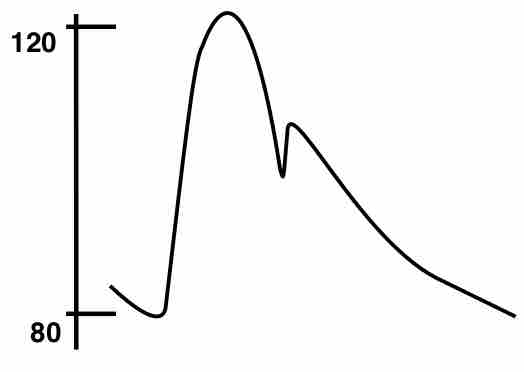In healthy adults, physiological blood pressure should fall between the range of 100-140 mmHg systolic and 60-90 mmHg diastolic. Blood pressures above this are classed as hypertension and those below are hypotension, both considered medical conditions.
Hypertension
Hypertension or high blood pressure, sometimes called arterial hypertension, is a chronic medical condition in which the blood pressure in the arteries is elevated above 140/90 mmHg.

Arterial Blood Pressure over the Cardiac Cycle
Graph showing changes in blood pressure during a single contraction-relaxation cycle of the heart.
Hypertension is classified as either primary (essential) hypertension or secondary hypertension; about 90–95% of cases are categorized as "primary hypertension" which means high blood pressure with no obvious underlying medical cause. The remaining 5–10% of cases (secondary hypertension) are caused by other conditions that affect the kidneys, arteries, heart, or endocrine system.
Hypertension is a major risk factor for stroke, myocardial infarction (heart attacks), heart failure, aneurysms of the arteries (e.g. aortic aneurysm), peripheral arterial disease and a cause of chronic kidney disease. Even moderate elevation of arterial blood pressure is associated with a shortened life expectancy. Dietary and lifestyle changes can improve blood pressure control and decrease the risk of associated health complications, although drug treatment is often necessary in people for whom lifestyle changes prove ineffective or insufficient.
Hypotension
Hypotension is a medical condition in which the blood pressure in the arteries is reduced below 100/60 mmHg. Hypotension is best understood as a physiological state rather than a disease and is often associated with shock, though not necessarily indicative of it. However, blood pressure is considered too low only if noticeable symptoms are present.
For some people who exercise and are in top physical condition, hypotension is a sign of good health and fitness. For many people, low blood pressure can cause dizziness and fainting or indicate serious heart, endocrine, or neurological disorders. Severely low blood pressure can deprive the brain and other vital organs of oxygen and nutrients, leading to a life-threatening condition called shock.